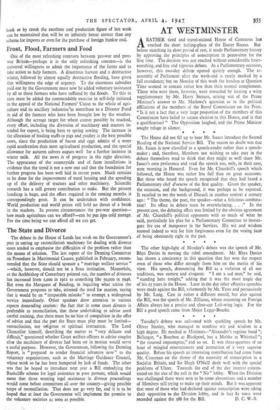AT WESTMINSTER
ARATHER tired and travel-stained House of Commons has reached the short halting-place of the Easter Recess. But before snatching its short period of rest, it made Parliamentary history by approving the principles of conscription in peace-time for the first time. The decision was not reached without considerable heart- searching, and free and rigorous debate. As a Parliamentary occasion, however, this two-day debase opened quietly enough. The re- assembly of Parliament after the week-end is rarely marked by a full attendance; but on Monday of this week the benches at Question Time seemed to contain rather less than their normal complement. Those who were there, however, were rewarded by hearing a witty supplementary by Mr. Harry Strauss, arising out of the Prime Minister's answer to Mr. Marlowe's question as to the political affiliations of the members of the Royal Commission-on the Press. "Is it not a fact that a very large proportion of the members of this Commission have failed to secure election to this House, and is that a qualification?" The Opposition laughed, and the Prime Minister sought refuge in silence.
* * * * The House did not fill up to hear Mr. Isaacs introduce the Second Reading of the National Service Bill. The reason no doubt was that Mr. Isaacs is now classified as a speech-reader rather than a speech- maker; and, therefore, Members not wishing to take part in the debate themselves tend to think that they might as well share Mr. Isaacs's own preference and read the speech too, only, in their case, next morning in Hansard. Even for Mr. Churchill's speech which followed, the House was rather less full than on great occasions. But those who heard the speech recognised that they had heard a Parliamentary chef d'oeuvre of the first quality. Given the speaker, the occasion, and the background, it was perhaps to be expected. It recalled to me the words of Disraeli in another context a century ago: "The theme, the poet, the speaker—what a felicitous combina- tion! Its effect in debate must be overwhelming. . . ." In the present case, the debating effect was limited by the obvious agreement of Mr. Churchill's political opponents with so much of what he said, particularly his plea for a Parliamentary Committee to investi- gate the use of manpower in the Services. His wit and wisdom seemed indeed to win for him forgiveness even for the vexing fault of being obstinately right in the past.
* * * * The other high-light of Monday's debate was the speech of Mr. Rhys Davies in moving the rebel amendment. Mr. Rhys Davies has shown a consistency in this question that has won the respect even of those who differ strongly from him on the merits of his view. His speech, denouncing the Bill as a violation of all our traditions, was earnest and eloquent. "I am a sad man," he said, "standing here tonight," adding that it was the most tragic day of his 25 years in the House. Later in the day other effective speeches were made against the Bill, vehemently by Mr. Yates and persuasively by Mr. Lang. Cast in rather a different mould, but also against the Bill, was the speech of Mr. Zilliacus, whose reasoning on Foreign Affairs always has a precise and clear-cut Left-wing logic. For the Bill a good speech came from Major Legge-Bourke.
* * * * Tuesday's debate was enlivened with sparkling speech by Mr. Oliver Stanley, who managed to combine wit and wisdom in a high degree. He mocked at Ministers—"Alexander's ragtime band "; Bellenger, "a Bourbon at Blackpool, but a Moltke at Whitehall "; "the roneoed impromptus," and so on. It was three-quarters of an hour of mingled entertainment and instruction of a very superior quality. Before his speech an interesting contribution had come from Mr. Crossman on the theme of the necessity of conscription in a Socialist Britain, and Sir Hugh O'Neill dealt well with the special, problems of Ulster. Towards the end of the day interest concen- trated on the size of the roll in the "No" lobby. When the Division was challenged there were seen to be some abstentions and a number of Members still trying to make up their minds. But it was apparent that most of those who had declared against conscription were taking their opposition to the Division lobby, and in fact 85 votes were recorded against the 386 for the Bill. D. C. W.-S.


































 Previous page
Previous page